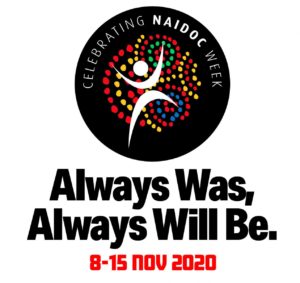NAIDOC Week (November 8 – 15) is about more than a demand for respect, it is about making a more just and decent Australia in which all people can be proud of the society they have built, writes ANDY HAMILTON SJ.
 This year, the theme of the National Aboriginal and Islander Day Observance Committee (NAIDOC) Week is particularly timely. It is about ‘building pride in our communities’. In Indigenous and Islander communities, as in other communities in Australia, COVID-19 has brought anxiety and increased the threat of mental illness. Strong communities linked in pride in their identity are central in responding to the virus.
This year, the theme of the National Aboriginal and Islander Day Observance Committee (NAIDOC) Week is particularly timely. It is about ‘building pride in our communities’. In Indigenous and Islander communities, as in other communities in Australia, COVID-19 has brought anxiety and increased the threat of mental illness. Strong communities linked in pride in their identity are central in responding to the virus.
NAIDOC Week, of course, is built on pride: the pride that led Indigenous people who recognised that they were neither respected nor heard to work for change. They saw that it inappropriate to celebrate Australia Day on the anniversary of the arrival of the First Fleet, which marked the beginning of their dispossession. They began to organise in order to find recognition and acceptance by other Australians of their right to participate in society, but faced opposition at every corner. They drew up a petition to send to King George V to ask for Aboriginal electorates, but the Government saw it as outside its constitutional powers to provide them. In 1938 a Congress of Indigenous people met in Sydney. Its members marched on Australia Day, which they called Mourning Day.
Australia Day is still held on the anniversary of Indigenous expropriation, but NAIDOC Week was born and continues. It provides an opportunity for all Australians to join in celebrating the culture and aspirations and hopes of Indigenous and Torres Strait Islanders. And to listen to their voice.
The theme of NAIDOC Week this year recalls the pride of its origins. It also links the week to other contemporary expressions of pride that cross national boundaries. The Black Lives Matter movement, which began in the very different society of the United States, spread across the world and to Australia because so many of the attitudes and institutional practices affecting Indigenous peoples said that Black Lives did not matter. Far too many Indigenous and Islander people experienced humiliation and not pride in the responses from other Australians. The way that the protests drew in sportspersons of many racial origins and immigrants from many nations have strengthened the pride that young people take in their identity as First Australians and their determination to be heard.
NAIDOC Week is about more than protest and a demand for respect. It is about making a more just and decent Australia in which all people can be proud of the society that they have built, in which justice, equality and a fair go are not just words but are expressed in the way people are treated. That is a shared pride.
The week is focused on the Indigenous and Islander communities. But it is about all Australian communities. It is about forming the respectful and decent relationships that engender pride within communities. The Week is a time for engaging with one another, for recognising and celebrating the many ways in which pride is being built in Indigenous communities, and for pressing for respect in government and other institutions.

